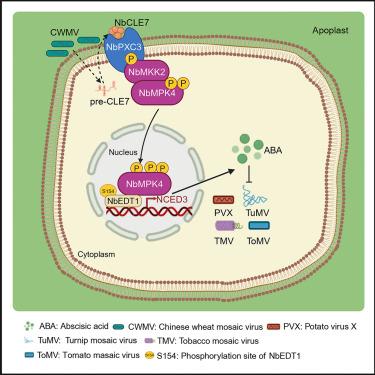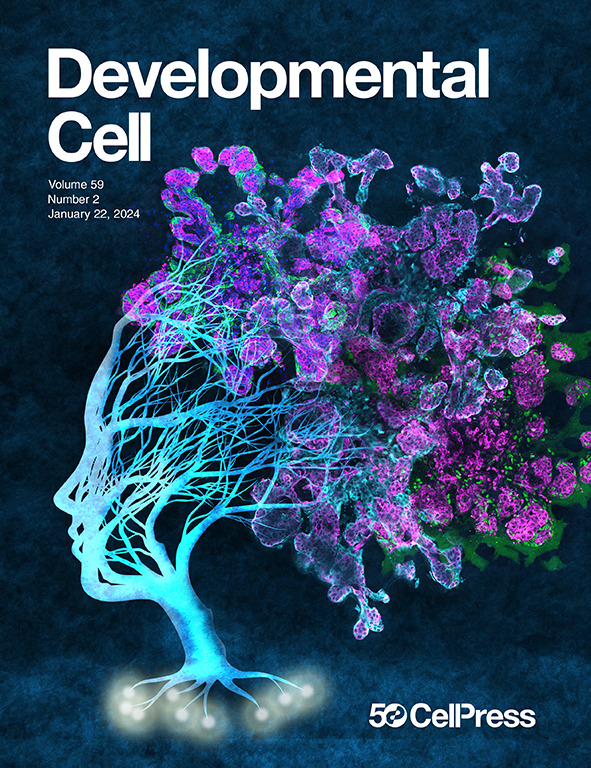The plant signal peptide CLE7 induces plant defense response against viral infection in Nicotiana benthamiana
IF 8.7
1区 生物学
Q1 CELL BIOLOGY
引用次数: 0
Abstract
In plants, small peptides are important players in the plant stress response, yet their function in plant antiviral responses remains poorly understood. Here, we identify that the plant small peptide, CLAVATA3/ESR-RELATED 7 (CLE7), enhances plant resistance to Chinese wheat mosaic virus infection in Nicotiana (N.) benthamiana. Subsequent investigations demonstrate that CLE7 recognizes receptor kinase NbPXC3 to control the plant antiviral response. Moreover, CLE7-NbPXC3 signaling induces NbMKK2-controlled NbMPK4 phosphorylation, resulting in phosphorylation of the transcription factor NbEDT1. NbEDT1 phosphorylation is involved in the transcriptional activity of NbNCED3, which is a rate-limiting enzyme in abscisic acid (ABA) biosynthesis. Moreover, CLE7 activates broad-spectrum disease resistance to multiple RNA viral infections. Our study indicates that CLE7 induces a plant antiviral response through a series of immune signal transductions in N. benthamiana and provides a foundation for the exploration of efficient viral disease management methods based on plant small peptides.

植物信号肽CLE7诱导植物防御病毒感染
在植物中,小肽是植物胁迫响应中的重要角色,但它们在植物抗病毒响应中的功能仍鲜为人知。在这里,我们发现植物小肽 CLAVATA3/ESR-RELATED 7(CLE7)能增强烟草(N. )benthamiana(N. )对中国小麦花叶病毒感染的抵抗力。随后的研究表明,CLE7 能识别受体激酶 NbPXC3,从而控制植物的抗病毒反应。此外,CLE7-NbPXC3 信号诱导 NbMKK2 控制的 NbMPK4 磷酸化,导致转录因子 NbEDT1 磷酸化。NbEDT1 磷酸化参与了 NbNCED3 的转录活性,而 NbNCED3 是脱落酸(ABA)生物合成过程中的限速酶。此外,CLE7 还能激活对多种 RNA 病毒感染的广谱抗病性。我们的研究表明,CLE7 通过一系列免疫信号转导诱导 N. benthamiana 产生植物抗病毒反应,为探索基于植物小肽的高效病毒病管理方法奠定了基础。
本文章由计算机程序翻译,如有差异,请以英文原文为准。
求助全文
约1分钟内获得全文
求助全文
来源期刊

Developmental cell
生物-发育生物学
CiteScore
18.90
自引率
1.70%
发文量
203
审稿时长
3-6 weeks
期刊介绍:
Developmental Cell, established in 2001, is a comprehensive journal that explores a wide range of topics in cell and developmental biology. Our publication encompasses work across various disciplines within biology, with a particular emphasis on investigating the intersections between cell biology, developmental biology, and other related fields. Our primary objective is to present research conducted through a cell biological perspective, addressing the essential mechanisms governing cell function, cellular interactions, and responses to the environment. Moreover, we focus on understanding the collective behavior of cells, culminating in the formation of tissues, organs, and whole organisms, while also investigating the consequences of any malfunctions in these intricate processes.
 求助内容:
求助内容: 应助结果提醒方式:
应助结果提醒方式:


